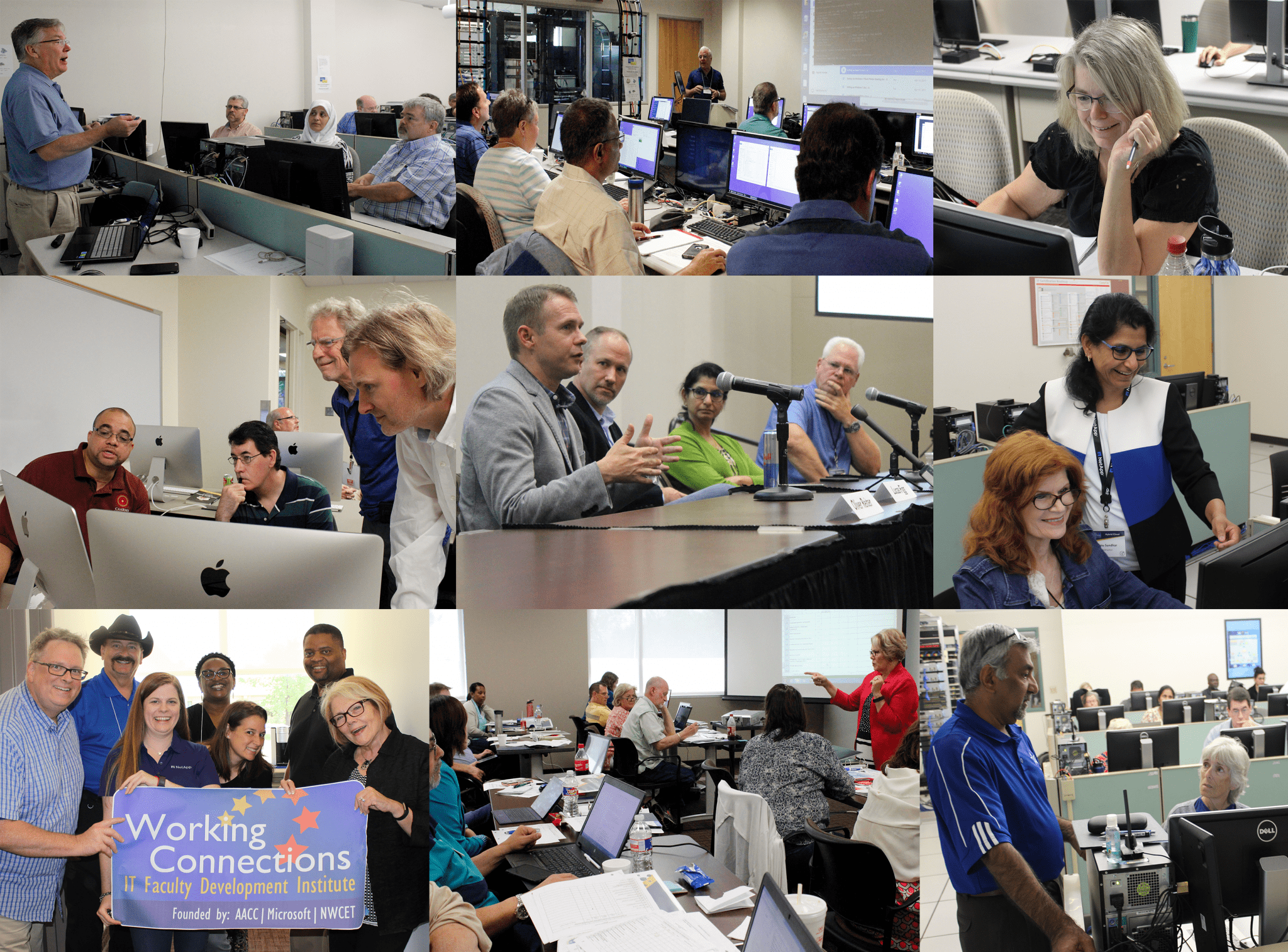Winter Working Connections Data Shows the Program Success
The National Convergence Technology Center (CTC) recently wrapped up its 12th annual Winter Working Connections professional development event, welcoming 76 faculty members from 54 schools. Only the December 2020 event attracted more attendees. As regular blog readers might recall, for the first time, some Winter Working Connections tracks extended beyond the usual three-day schedule – two advanced cloud tracks (“Microsoft Azure Administrator Certification” and “AWS Academy Cloud Architecting”) met for a total of five days. “Introduction to Alteryx Designer and SparkED” and “Introduction to Bitcoins, Blockchains, Ethereum and Smart Contracts” stuck to the traditional Monday, Tuesday, Wednesday format.
As always, the conclusion of Working Connections means the collection of attendee evaluations. Below are some highlights, which includes a look at how Winter 2021 stacked up against attendee surveys from previous Working Connections events. 
* Overall satisfaction with Working Connections remains high. Of the four most recent Working Connections surveys, we looked at (2020 Summer and Winter, 2021 Summer and Winter), none had less than 90% of survey respondents “strongly agreeing” or “agreeing” to the statement that Working Connections provided “high quality IT training” and “showcased best practices.” Indeed, these figures would likely be higher if corrected for those respondents who answered the question incorrectly, mistakenly selecting “strongly disagree” when the remainder of their survey response indicated satisfaction. Likewise, across the last three Working Connections surveys (this wasn’t a question asked for Summer 2020), over 81% of respondents “absolutely” would recommend Working Connections training to a colleague.
* Technical issues are declining. Only four 2021 Winter Working Connections attendees (6% of survey respondents) reported technical problems with their online learning, which is a big change from the 19% who reported problems during Summer Working Connections in July 2020, which had to be moved online because of the pandemic. Perhaps over these last two years everyone has become very comfortable managing virtual interactions on platforms like Zoom.
* Half of attendees prefer online summer training. When the 2020 edition of Summer Working Connections moved online for the first time, an entirely new group of faculty from across the country was now able to attend. In most previous summers, getting 30 “first time” attendees to travel to North Texas in person would have been a success. In July 2020, however, 66 new attendees (over a third of the entire cohort) signed up for the online event. Since then, each Working Connections survey has asked attendees how they’d like to attend the next Summer event. The results have been surprisingly consistent – across all four surveys (2020 Summer and Winter, 2021 Summer and Winter) between 46% and 51% of attendees reported a preference for an online Summer Working Connections. These results have informed the National CTC’s planning for the 2022 event, which will hopefully feature both in-person and online tracks.
* Forging new relationships online isn’t easy. Only 65% of Winter Working Connections survey respondents reported making brand new connections with other attendees, which is down considerably from the 80% who answered “yes” just a year ago at the 2020 Winter Working Connections. Part of the problem with online events is the lack of a common space – like the lunch line, the breakroom, or even a hotel shuttle ride – where mingling and small talk is so easy to do. But the decline from 80% to 65% may also suggest an overall level of fatigue in taking extra steps online to develop new relationships. The next bullet point also addresses the challenges of online connections.
* Connecting to one’s instructor seems to be easier than connecting with classmates. 90% of survey respondents at 2021 Winter and 2021 Summer reported feeling “very connected” or “somewhat connected” to their instructor. By contrast, only 62% (Summer 2021) and 73% (Winter 2021) reported feeling “very connected” or “somewhat connected” to their online classmates. This may be important information for faculty to consider when leading their own virtual classrooms if collaboration and engagement among the students is required – it’s understandably much easier to form a relationship with the class leader doing the lecturing than the gallery of faces sitting quietly on the Zoom screen.
Your National CTC staff is already planning for Summer Working Connections, set for this coming July 11-15, 2022. The plan is to offer both in-person tracks – the first time we’ll be getting together in person since July 2019 – and online tracks. Even better, this summer marks the 20th anniversary of Summer Working Connections in North Texas, so we are planning some special events and activities to mark this milestone. We hope you can join us. Look for more details soon – the invitations are scheduled to go out in late March.
If you’re an IT instructor at a high school, a community college, or a four-year university, let us know if you’d like to be added to the Working Connections invite list.
